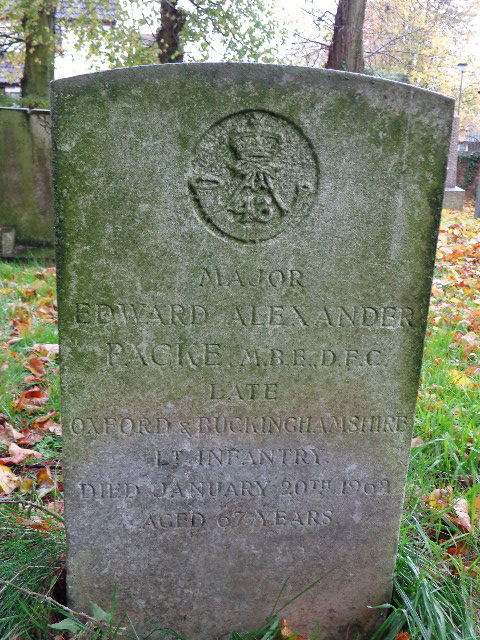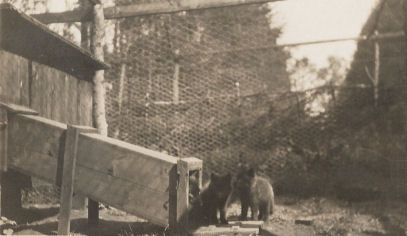ObituaryFrom the 1962 Regimental Chronicle of the Oxfordshire and Buckinghamshire Light Infantry, by Lieut, Colonel Sir J.E.H. Neville M.C.MAJOR EDWARD ALEXANDER PACKE, M.B.E., D.F.C., of The End Cottage, Felpham, Sussex, died in hospital on 20th January (1962) after a long illness. He was the son of the Reverend William James Packe, M.A., of Stretton Hall and Glen, Leicestershire, and vicar of Feering, Essex. He was born on 23rd June 1894 and was educated at Haileybury and Exeter College, Oxford. On 6th August 1914 he enlisted in the lst Battalion The Somerset Light Infantry, then stationed at Colchester in the 11th Brigade of the 4th Division. His condition, before enlistment, that he should go on active service was accepted by the commanding officer. So without any training, save that in his school officers' training corps, Packe was one of 1,100 officers and men who left Harrow to cross the channel on 22nd August to Havre. The following day his regiment entrained in cattle trucks and reached Le Cateau on the 24th. Two days later he came under fire in the battle of Le Cateau. He wrote in a letter home, "It isn't in the bounds of human possibility to double 400 yards in our equipment (80 pounds weight) and arrive with strength to shove a bayonet through a piece of paper." Thereafter he took part in the retreat to the Marne, the advance, to the Aisne and move north to Ypres. He survived the first battle of Ypres in October 1914 without a scratch and described in his diary the heavy fighting at Ploegsteert, when his company counter-attacked in field service marching order with 50 extra rounds and in sodden greatcoats and later he was a witness of the truce in the front line at Christmas when "the quiet sounded very strange." Later in February 1915 he was commissioned and joined the 6th Battalion of The Dorsetshire Regiment on the 28th and served therein in the trenches at Wytchaete, St Jean, Voormezeele and Hooge until he received a regular commission on 17th November 1915 and was transferred to the 5th Battalion of the Regiment then at Vlamertinghe. On 19th January 1916 he joined the Royal Flying Corps, first as an observer and later as a pilot. He recorded in his diary, 26th January, "I cannot describe my feelings at living out of the reach of shell fire, being always clean and having a dry, warm bed to go to at night." He was an observer on a contact patrol on lst July, the first day of the battle of the Somme. On his return, wounded in the buttock, none would believe his first report of the battle: "It was an awful sight to see our men lying out in lines opposite Beaumont Hamel either dead or wounded." On recovery from his wound he was taught to fly and passed his test for pilot on 9th November 1916 and on the next day became an instructor with a total flying time of a little over 20 hours. Those were the days when pilots flew "across country with a map torn from the back of a Bradshaw railway guide." |
 Grave of Edward Packe at Feering |
He was back in France on 11th August 1917 with 32 Squadron and promoted captain and flight commander on 10th October. In a single-seater fighter he was patrolling and fighting through the last spasms of the third battle of Ypres and recording regularly dud plugs and jammed gun. Mentioned in dispatches (London Gazette, 20th May 1918) he was awarded the distinguished flying cross at the end of the war in 1919. After 18 months on the staff at the Air Ministry from April 1918 to October 1919 he was posted to the 52nd at Cork and was cross-posted to the 43rd at Limerick in July 1920.
The Sinn Fein rebels at this time were waging war against the Royal Irish Constabulary. The military, called in aid of the civil power, were forbidden to open fire until fired upon. Packe, appointed intelligence officer with two non-commissioned officers under command, was in his element working day and night in close co-operation with the police and often alone in uniform among a hostile population. Not until murders, ambushes and kidnappings became very serious were the intelligence sections allowed to work in plain clothes. It is one thing to face a known enemy with comrades behind and on the flanks, it is another to wander alone and a marked man in the dangerous slums of a city such as Limerick was in those days. So successful was he in his investigations, in the tracking and harrying of the rebels, that he was given half an hour to pack and quit the station by the commanding officer (Lieut.-Colonel Stapleton) on receipt of unimpeachable evidence that his name was at the top of the rebels' black list. That was in December 1921 and on 1st January 1923 he was awarded the M.B.E. and was the only officer in the south of Ireland, not serving on the staff, to be so rewarded for his service in the Sinn Fein rebellion. He was promoted captain the same day and served with the 43rd until he retired on 2nd August 1930.

|
Like most fearless men, and he was quite fearless, he was gentle, and to see him handle animals was an experience not to be forgotten, for he had the gift of winning the confidence of both shy and fierce animals. It was not surprising that on retirement he went in for fox farming in Bedfordshire to breed silver foxes for stock. But for all his faith and patience the farm failed and he got a job with Player's tobacco until Hitler's War, when he reported at the depot on mobilisation. In September 1939, as a captain aged 45. In December he was posted to France as A.I.L.O. (believed to stand for air intelligence liaison officer). Returning through Dunkirk he served for the rest of the war with the Royal Air Force in England. He went back to Player's on demobilisation, but in 1956 tuberculosis in both lungs was discovered. After seven months in hospital he was discharged cured; but his lungs were so impaired that when he contracted pneumonitis late in 1957 his condition was considered hopeless. Yet, against all expectations, he recovered and struggled on, refusing to surrender to an invalid's life in spite of an operation in April 1961 on a perforated lung. Then at Christmas he got influenza, which, attacking his lungs again, overtaxed his heart. He died as he lived, a fearless, just and upright man and was buried at Feering on 24th January 1962. |
In 1919 he married Claudia, daughter of the Reverend C.W. Barclay, M.A., vicar of Hertford Heath, and of Florence Barclay, the well-known novelist. His wife survives him with a son and two daughters.
J.E.H.N.
Jim Neville was a great friend of Edward Packe and must have read the
Diaries.
